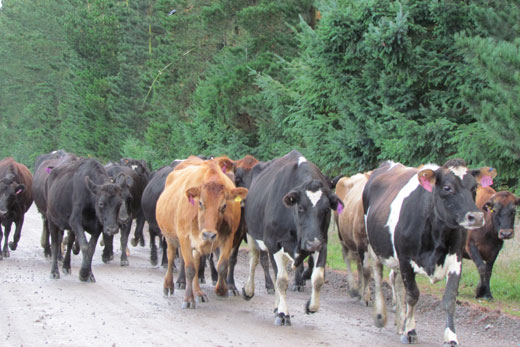Motorists and farmers are being warned to be extra cautious as sharemilkers and farm owners move properties via the region's roads today.
A herd of cows on the move. Photo: file.
Gypsy Day – the annual movement of farmers shifting herds, families, farm machinery and household items around NZ to new farms for the 2014/2015 dairy season – this year collides with the Queen's Birthday long weekend.
This means farmers and holidaymakers will be on the roads today – and both road users are being encouraged to be extra vigilant to prevent accidents.
Federated Farmers Sharemilkers' Section chairperson Neil Filer says dairy areas will see stock trucks flat out and farmers moving stock on roads.
'[Farmers need to] Have plenty of staff on hand and wear helmets and high visibility clothing if your team are operating quads and bikes.
'We'd also like to ask motorists to be patient if you do encounter a herd on the road. Please do not use a car horn, as that will spook stock. Farmers want to get the move done quickly, so please follow their instructions.”
Coromandel MP Scott Simpson says his region's roads are likely to be busy with animal transportation and visitors travelling to and from the peninsula.
'And that's on top of the heavier holiday weekend traffic,” says Scott.
'Motorists need to be extra cautious. If they meet stock on the road, they need to be patient and follow farmers' instructions.”
Scott says Federated Farmers is also advising its members to plan their move carefully, as good preparation can help minimise the amount of effluent left on the roads.
Detective Sergeant Neville Ross says the long weekend provides farmers extra time to move but can potentially cause traffic woes as others go on holiday.
'Potentially, this can create a number of traffic issues for motorists and the effluent from herds of cows can create a potential hazard on our roads drivers need to be aware of.”
But Neville says another aspect of Gypsy Day can leave more than just a bad smell.
'That is dishonest people taking advantage of what's going on, be they farm workers moving on who are tempted to take ‘their' farm bike with them, or opportunist thieves out to make a quick buck.”
As result, Police are urging farmers not to be complacent when securing valuable farm equipment such as vehicles, farm pharmaceuticals, chemicals, firearms and tools.
'Gypsy Day isn't just about moving farms; it's also about moving home and for the kids, often moving schools.
'By being vigilant and securing the vehicles and buildings on your property you can remove at least one stress and ensure you start the new season with all your property intact.”
DairyNZ animal husbandry and welfare team manager Chris Leach says a good plan ensures stock arrive at their new destination fit and well for winter.
'If going onto different feed, cows need a feed transition plan. Gradually ease them onto new feed over a week to 10 days, prior to transport.”
Chris says animals must also be fit, healthy and able to bear weight on all four legs when being moved.
'So, all farmers should check cows for any signs of ill health. Talk to your vet if you have any concerns.”
Federated Farmers top tips for Gypsy Day 2014 Selection of stock - Cows must be fit and healthy - Cows must able to stand evenly on all four legs
- Cows must be acting normally and if not, please call the vet
- Body conditions score must be at least 3.0.
Prepare stock for travel
- Precondition cows. This is important for those travelling long distance and please click here for more information
- Stand all cows off green feed for a minimum of four hours and up to 12 hours to empty themselves
- Feed these cows straw, hay or baleage with free access to water.
Communication
- Book your stock transport in advance
- Ask for an estimated time of arrival of the truck to pick up the cows. This allows time to get the cows in and stand them off for the recommended minimum time (at least four hours). This may mean getting them in the night before
- Check the transport operator has a plan for the journey, covering: effluent disposal sites
- Adequate stops and rest periods (particularly for cows on long journeys)
- Talk to the farmer at the other end where your cows will be offloaded. Tell him what time you expect the truck to arrive
At the new farm
- Give all cows free access to feed and water on arrival
- Inspect the cows regularly over the first day; put them in a paddock that is convenient for you to do this
Effluent - Check the truck effluent tanks are empty before the journey
- In some instances, farmers can accept effluent from the stock truck. Please see here for tips on how to management this.
- Download Fact sheet: Discharging effluent on-farm.



0 comments
Leave a Comment
You must be logged in to make a comment.